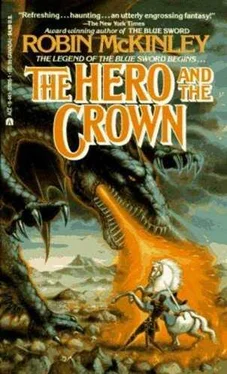“Evidently not,” she replied, and looked straight at him, although she still leaned on the table. “If it was so important, and the Black Dragon, even in death, so insidious, why did you not come and fetch me?”
There was a little pause, and Luthe smiled faintly. “I shan’t try to bully you again.”
“You have not answered my question.”
“I don’t wish to answer it.”
She could not help herself, and she laughed: he sounded so much like a sulky child. And her laugh rang out, clear and free, as it had not done since she had first heard the name of Maur.
Luthe looked at her in wonder. “Yes, I believe I can cure you. I cannot believe that I will be let fail.”
“I am glad to hear that,” she said, and found herself surprised that she spoke the truth, and her mouth curled in a wry smile. “I am glad.”
Luthe, watching her, knew both the truth of her words and the surprise they had caused her. She wandered around the little table till she came to another chair, and settled lightly into it; and with the smile still on her lips, her eyelids drooped, and she fell into the light doze of the chronic invalid, and sagged against the side of her chair, and Luthe watched over her sleep as Tor often had, and their thoughts were very similar. But Luthe had a choice to make, and a choice that he did not like; and it was a choice that must be made soon. Even as he thought of this choice, he knew the decision had already been made. But he was in no hurry that Aerin wake again, and he do what he must.
SHE COULD NOT THINK where she was when she awoke. She was sitting in a tall wooden chair, and a fire burned in a hearth not far from her outstretched feet; and she was in a hall so vast she could not see the ceiling. It was not until Luthe walked between her and the hearth, to lay another log on the fire, that she remembered all that had passed; and she sighed.
He turned to her at once, his face still solemn and frowning. “Talat?” she said, as if he was always the first thing on her mind. Luthe, exasperated, said: “If you have so little faith in my ability to look after one fat, elderly, self-centered stallion, then I will show you proof.” He leaned over her again and picked her up, and strode out of the great grey hall.
“I can walk,” said Aerin, with dignity.
“No, you can’t,” said Luthe over the top of her head, “although at some date in the near future you will have the opportunity to relearn.”
He set her down, finally, on her own feet, at the edge of a wide unfenced meadow; several brown cows grazed in it, and at its farthest edge she saw one or two deer raise their heads and look toward her; but they did not seem alarmed.
Then she heard Talat’s great ringing neigh, and he galloped up to them, coming to a sliding halt at the last minute (Luthe muttered something that sounded like “Show-off”), and slobbered green and purple down her shirt. “Horses,” said Luthe with disgust; but she took a step away from his steadying hand to wrap an arm over Talat’s non-existent withers.
“Here, then,” said Luthe. “You can be of some use.” He boosted her onto Talat’s well-rounded back and walked off. “This way,” he said over his shoulder, and Talat pricked his ears and followed docilely. But Luthe’s long legs covered the ground at a good pace, and Talat had to stretch himself to keep up, for he would lose his dignity if he broke into a trot; and so his ears eased half back in disapproval of so rude a speed. Aerin laughed her small half-laugh, that she would not cough.
They came soon to the edge of a wide silver lake. Aerin blinked her dim eyes, for it was hard to determine where the land ended and the water began; the stones of the shore were a barely flatter, duller grey than the water’s gleaming surface. Talat stopped when his hoofs crunched on pebbles; it was the worst sort of footing for a horse with an unreliable leg. Luthe continued to the very edge of the water, and as he stopped just before he got his feet wet, the water gave a sudden little gloop and ripple, and a small outthrust finger of water reached out and splashed his toes. Luthe muttered something under his breath and the water replied by hunching itself up into ridges, and several tiny wave-edges crept humbly up the shoreline, but none quite touched his feet. “Here,” called Luthe.
She slid off Talat’s back, but found within two steps that Luthe had been right, she really couldn’t walk. She sank down where she had been standing, and Talat crunched up beside her and lowered his nose for her hand, his ears saying anxiously, “It’s all my fault—I don’t really mind these wretched small stones—do please stand up again and I’ll carry you.”
Then Luthe was kneeling beside her, and he lifted her in his arms again; his hands were wet to the elbows. He set her down, carefully, by the lake’s edge, and the water shouldered up in small ripples again, and flung itself up the stones toward her as if curious; but it did not quite touch her. Luthe dipped his hands into the water again, and held the leaky cup to her lips.
“Drink,” he said.
“Is this another sleeping draught?” she said, trying to smile; but he only looked sad and grim.
“No,” he said. The water dripped on her leg, and its touch through the cloth was somehow personal, soothing like the hand of a friend.
She drank awkwardly, over his thumb, and the water was silver, almost white, even against Luthe’s pale skin; and it was faintly sweet, and cold, and wild, somehow, wild with a wildness she could not put a name to beyond just that: wild. It seemed to course down her throat of its own volition, and foam up in her stomach. She looked up and met Luthe’s blue frowning gaze as he bowed over her and his cupped hands. She said, “What is—? Not water,” and then he and the lake and the taste of the water on her tongue disappeared; but just before her mind spiraled away after them she felt hands clamp on her shoulders, wet hands, for she could feel the damp through her sleeves, and these hands dragged her to her feet, “Aerin,” came a voice from very far away, and then she no longer had feet, or ears either. Aerin.
Her lungs were on fire like a swimmer’s too far underwater, and she clawed her way toward the surface, and toward the voice that still called her name; and it seemed that her face broke the surface of the water which held her, and for a moment she lay gasping. The voice again. Aerin.
She opened her eyes, and she was not on the shores of a silver lake, though a tall man stood before her, calling her name, and offering her a goblet. Drink, he said.
She reached to take the goblet; reached out to take it with her left hand, and noticed with mild surprise that the arm was unscarred and strong. Ah, she thought wisely, I am dreaming again; but she paused before she took the goblet, and looked around her. She stood in a wide chamber that at first she thought was round, till she realized the walls were straight, but that there were five of them. She looked up, and there was a heavy weight of bound hair on her head, and this preoccupied her, so she did not examine the strange clawed creatures that writhed, black and red and yellow, against that ceiling. She lowered her head again, puzzled, for she had never been in this room before, and yet its red walls seemed familiar to her.
Drink, said the man again, and his voice was impatient. Drink. The goblet in his outstretched hand trembled very slightly, and she wondered why he was so eager for her to take the cup.
She tried to look up into his face, but he wore a cloak with a hood, a red cloak, so bright that it hurt the eyes, and the hood was so deep she could not see the face within it. Drink, he said, half mad with impatience, and it occurred to her at last that this was not Luthe she stood before.
Читать дальше












